In Poland and Germany they chanted ‘Death to the Jews’ – in Israel they chant Death to the Arabs’ – but if you compare this to the Nazis you are anti-Semitic!
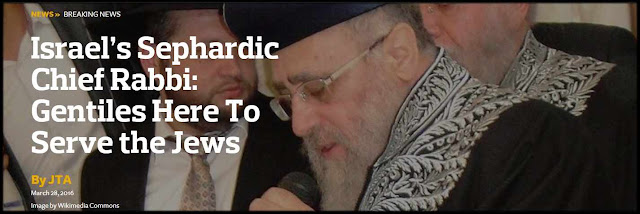
What is shocking about Israel is not the exceptional cases of violence and murder, such as the firebombing and burning alive of the Dawabshe’s five years ago. It was an attack that left both parents and baby Ali dead and four year old Mohammed, with 60% burns.
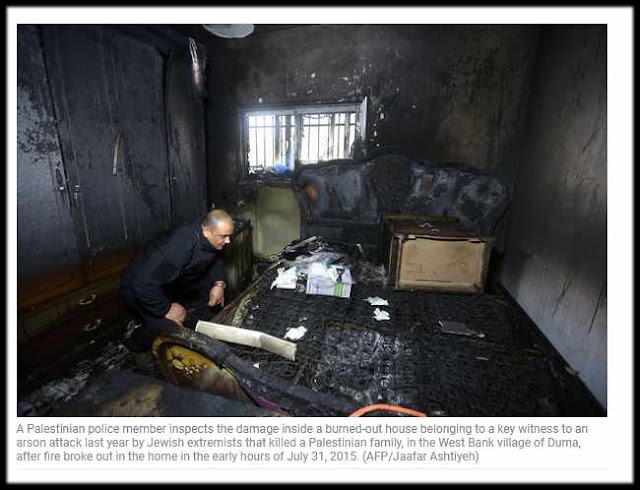
Neither is the refusal to compensate the surviving child, Mohammed, anything remarkable. Israel is a Jewish state and it is understandable that non-Jews, even if they are victims of Jewish terrorism, should not be entitled to such sums. The logic of Avigdor Lieberman, the Defence Minister at the time, was that paying Mohammed compensation would have meant a transfer of money from Jewish to non-Jewish hands.
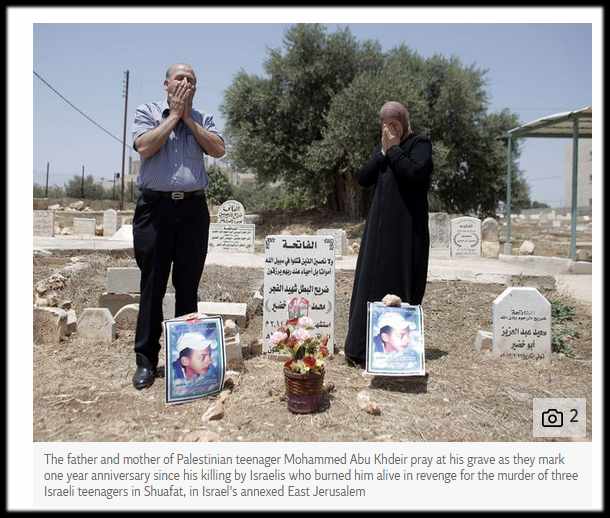
Not even the burning alive from the inside of 16 year old Mohammed Abu Khdeir, who had petrol poured down his throat, and the racist decision of Israel’s High Court that the homes of his killers would not be demolished, is difficult to understand. Of course Palestinian ‘terrorists’ have their homes or those of their families destroyed as a matter of course.
The High Court’s rationale was that there is no need to deter Jewish terrorists, because they are part of the family, unlike Palestinian terrorists who definitely aren’t one of us. And if you demolish a ‘Jewish house’ then that is a loss to the whole Jewish community. In a Jewish state such logic is impossible to defeat.
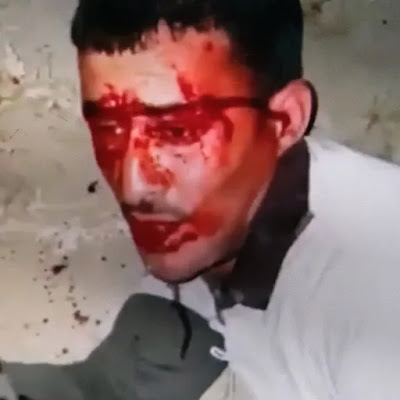
Another such case which is beginning to wend its way through the Israeli court system is a case concerning 5 members of the Border Guards, the most brutal and racist of all Israeli units. Gideon Levy and Alex Levac document how these thugs and criminals have been charged with 14 incidents of armed robbery, aggravated assault, abusing a helpless person, theft, destruction of evidence etc. These animals, because there is no other word for it,
humiliated, kicked, beat bloody and robbed Palestinian laborers who were trying to get to their jobs in Israel….. They went about it day after day, in mid-July, when the Meitar checkpoint in the southern West Bank, near Hebron, was closed due to the coronavirus pandemic. …
Most of the cases occurred in the middle of night, far from the eyes of others, during the predawn “shift” when Palestinian laborers from the territories set out on their long journey to work in Israel, to build its houses and pave its roads. According to the charge sheet, the accused would order the workers they hunted down and caught to empty their pockets and then confiscate their money. But to enhance the experience they would make the workers lie on the ground and beat them, kicking them all over, including on the head, punching them and threatening them with their weapons. Then the officers are alleged to have split the plundered money between them.
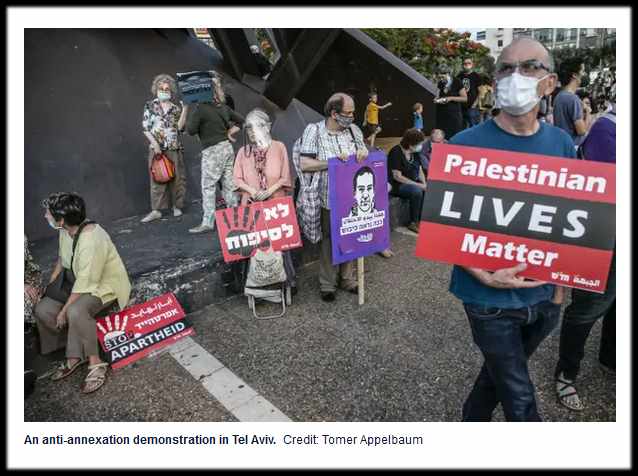
You must understand that the Israeli state has not turned over a new leaf. There has not been a change in policy regarding not prosecuting violent members of the army. These animals were so proud of what they were doing that they filmed their own actions to impress their girlfriends with their prowess. And no doubt their female companions looked adoringly into the eyes of these brave heroes as they consummated their relationships. In other words these animals convicted themselves.
I should add that Israel does not approve of corruption and theft by the military. Not because it has any principled objection to stealing from Palestinians. After all they have stolen most of their land, but because the right to steal Palestinian property is that of the State alone If every soldier has the right to steal then military discipline and order will break down as each soldier becomes an entrepreneur in his own right.
No soldier was ever prosecuted for war crimes in Gaza in 2014. Murdering Palestinians, including children, is not a criminal offence. However those caught stealing Palestinian credit cards were prosecuted because such behaviour is inimical to good order.
It was the same with the Nazis. Himmler also had SS members shot for theft of Jewish property. Killing Jews, of course, was no crime but individual theft of Jewish property was theft of State property. Such actions were held to undermine the SS’s moral order and had to be stamped out. See ‘I Waited for the Bullet That Would End This Nightmare’: Palestinians Brutalized by Israeli Cop Gang Speak Out
These are such horrific incidents that even Netanyahu will denounce them as unacceptable. In the case of the Dawabshes Shin Bet was even willing to torture the Jewish suspects in order to gain confessions. Torture in the case of Palestinians is the norm and goes unremarked but the torture of Jews? This was unacceptable to Zionist opinion and the Israeli court ruled these confessions inadmissible.
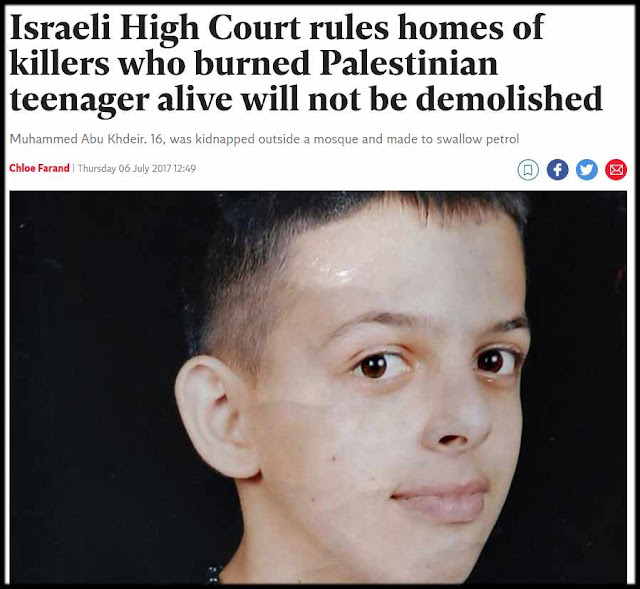
Palestinian confessions are never ruled inadmissible, however this too is different, because, as we all know, Palestinians have difficulty telling the truth unless they are forced to do so. The racist logic is impeccable and if you don’t understand it that is probably because you are anti-Semitic!
What is truly shocking is the routinised and normative racism in the Israeli state, both to Arab citizens of Israel and Palestinians of the Occupied Territories. It is the acceptance of such racism that is terrifying and which can only be explained by Israel’s existence as a Jewish state.
Below are a number of articles documenting this racism. The first article by Jonathan Ofir concerns the lynching of an Eritrean refugee, Haftom Zarhum. Zarhum’s real crime was being in the wrong place at the wrong time. His second crime was even more unforgivable in the eyes of Beersheba’s District Court.
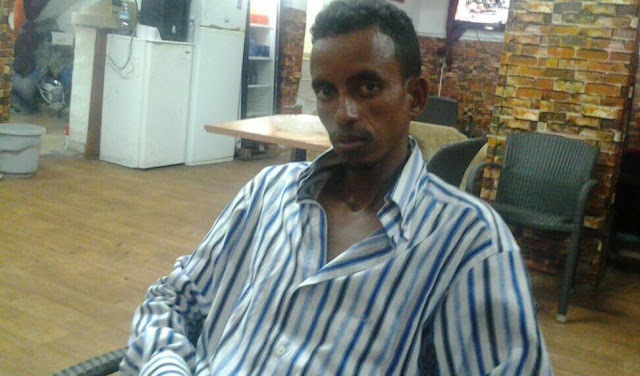
Death of an Eritrean ‘Infiltrator’
I covered this terrible story at the time in Death of an Eritrean ‘Infiltrator’. On October 15 an Israeli Arab opened fire in Beersheva’s bus station killing one soldier and wounding 11 others. Haftom was not even Palestinian but his dark skin was enough. He was, quite understandably, mistaken for the Palestinian attacker and shot 8 times. Although incapacitated the blood thirsty mob were not satisfied. The video I posted at the time is almost impossible to watch. It involves benches being thrown at his head and a savage beating to satisfy the blood lust of his attackers.
Ynet reported that medics trying to evacuate Zarhum “ran into objection from the crowds at the scene, who blocked their way and called out ‘Death to Arabs,”Arabs out!’ and ‘Am Israel Chai’ (‘The people of Israel still live’).”
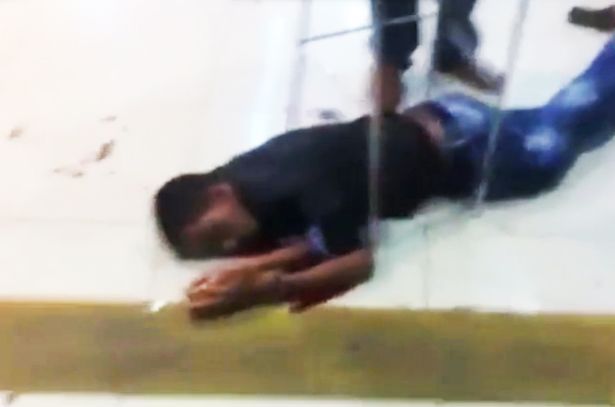
Two of the civilian attackers agreed to a plea deal. One received 4 months in prison and the other got 100 days of community service and 8 months probation. But the two security officers who were involved in the beatings quite understandably efused to accept a plea deal. The Israeli court agreed with them and they were acquitted.
As you might expect Jewish Judge Aharon Mishnayot, a former military judge, was not unsympathetic to the security guards. He said he was “certain that the defendants were convinced that the deceased was one of several terrorists”. As is well known, if you kill someone because you believe they are a terrorist then it stands to reason that you should be acquitted if you kill them under a mistaken belief.
It was the time of the ‘knife Intifada’ when nerves were on edge. The attacks had “created an atmosphere of fear and panic in the public”. Judge Mishnayot refused to
“ignore the connection of the event to the frequent terror events that had occurred in the state in those days, before the event at hand and the implications that this may have on the state of awareness of the involved”.
The fact that Haftom had already been incapacitated made no impression on the learned judge. That the actions of the mob were purely vengeful made no difference either.
Alma Bilbash noted a comparative case when in 2005 an Israeli soldier, Eden Nathan Zada, opened fire on a bus at the Palestinian-Israeli village of Shefa-Amr, killing four and wounding twelve. After having been restrained and handcuffed, he was beaten to death by the crowd. In this case it was the actual terrorist who was beaten to death.
That did not stop the State putting his attackers on trial and six Israeli Arabs were convicted of attempted manslaughter and aggravated battery. 3 were sentenced to 2 years prison, the others to 20, 18 and 11 months prison. But of course there is no comparison because the attackers in Beersheba were Jewish whereas in Shefa-Amr those who killed Zada were Arabs. Israel is a Jewish state and one should not therefore judge the actions of Arabs and Jews in the same way.
The Murder of Ahmad Manasra
Two articles by Gideon Levy and Hagar Shezof in Ha’aretz concern an Israeli soldier who shot and killed one Palestinian and injured another. The details are as simple as they are shocking.
The soldier fatally shot 23-year-old Ahmad Manasra who was killed while helping another Palestinian who had also been shot and seriously wounded by the same soldier. The soldier was charged with negligently causing death but was not charged with wounding the other man.
A car accident occurred in March 2019, when a Palestinian, Alaa Raida, was driving with his wife and two daughters. Another car crashed into them near the village of al-Khader, then fled the scene. When Raida got out of his car and waved his hands at the fleeing car, the soldier shot him, wounding him. Ahmad Manasra, who happened to be passing in a car, got out and was about to help Ahmad when he was shot. The pretext was that stones were being thrown. Since the soldier was in an armed pillbox he was clearly in no danger even if that had been true.
However the military authorities reached a plea deal. The military prosecutor proposed a sentence of three months’ community service in lieu of prison for an Israeli soldier accused of negligently shooting an innocent Palestinian to death.
Of course if it had been the other way round then there would have been screaming headlines about Palestinians with ‘blood on their hands’ who deserve life. The idea that a Palestinian guilty of killing an Israeli soldier would receive community service is risible. This after all is Israel and Israel is a Jewish state.
Israeli youth shout ‘death to the Arabs’ as cleaners hide in a wooden building – the Police arrest both attackers and victims!
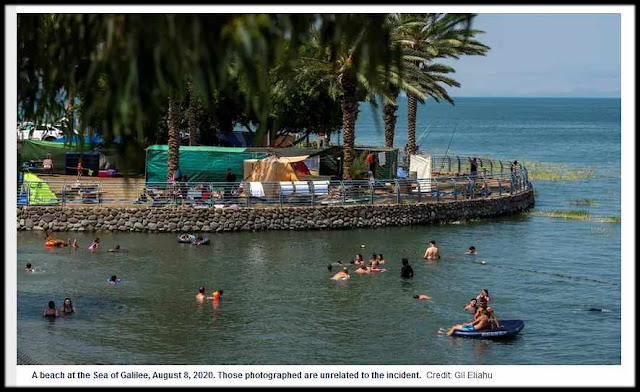
Two articles below concern the situation at a beach on the Sea of Galilee, a favourite destination for Israeli holiday makers. Naturally it is left to Israeli Palestinians to clean up.
One of the cleaners described how they brought a group of Hitler, sorry Hilltop youth,
“a garbage bag, and one of the girls in the group said that she doesn’t need the bag. ‘The Hasbani Stream is mine, Be’er Sheva is mine and so is Hebron. The whole country is mine and you are the ones who have to clean it,’ she said.”
You may tut tut but this girl is right. She should be congratulated on her knowledge of Jewish religious law, at least as taught by Israel’s neo-Nazi rabbis. According to Ovadia Yosef, the Sephardic Chief Rabbi of Israel, who on his death had the largest attendance at his funeral (over 1 million) of anyone in Israel:
“Goyim were born only to serve us. Without that, they have no place in the world; only to serve the People of Israel. Why are gentiles needed? he asked. They will work, they will plow, they will reap. We will sit like an effendi and eat,” he said to some laughter.
As you can see Ovadia Yosef was quite justly renowned for his wisdom. I should add, as the son of an Orthodox Rabbi myself, that the Jewish religion should no more be blamed for Ovadia Yosef’s Nazi-like racism than the Christian religion should be blamed for anti-Semitism or Islam for ISIS. There is nothing inherently racist in any religion. But when religions are tied to a state and that religion is used to demarcate the boundaries between inhabitants then that state will inevitably be racist. Religion provides the excuse, the rationale but it doesn’t create the kind of societies that employ this racism.
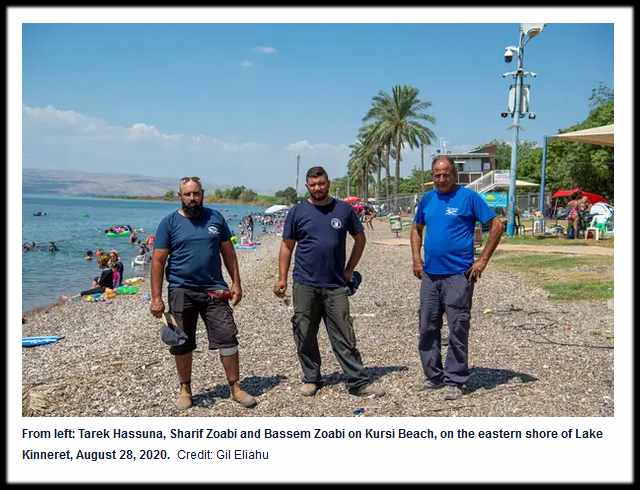
According to Bassam Zoabi, the work supervisor, the cleaners hid in a prefab structure, with some 200 people gathering around. He said people threw stones at the structure and yelled “death to Arabs,” [a favourite chant in Israel] and that pepper spray was used.
The police denied that the cleaners complained. Indeed once the Police arrived the Arab cleaners expressed their gratitude to the Jewish Hitler youth for having thrown stones at them. It was clearly a peace gesture.
It was not surprising in the circumstances that the Israeli Police arrested 5 people – 2 of the stone throwers and 3 of the cleaners. I know some people may cavil at this but it is quite fair. The Police refused to discriminate. They treated all parties as equal. This is even more fair when you think that the cleaners imposed themselves on Israel’s Hitler Youth by suggesting that they might consider cleaning up their own mess. These children understood that in a Jewish state they were entitled to make a mess and that non-Jews, instead of complaining, should clean up and be quiet.
The final article is self-explanatory. It involves Cameroonian philosopher Achille Mbembe, a renowned intellectual who was invited to a culture festival in Germany. Germany has not been immune from Black Lives Matter and the accompanying debate on racism. But Germany’s leaders are also signed up to Zionism.
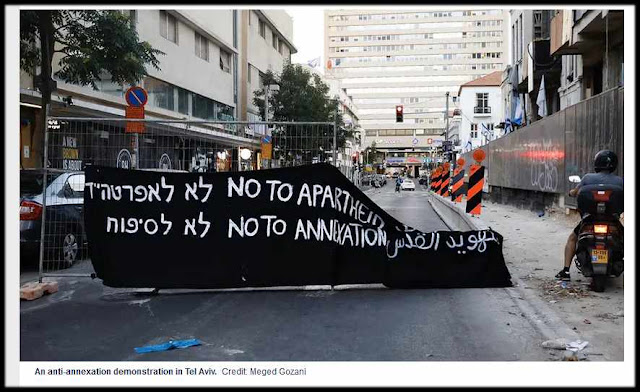
Mbembe’s ‘crime’ is supporting BDS. Naturally Felix Klein, Germany’s federal commissioner for the fight against antisemitism, demanded the revocation of Mbembe’s invitation to participate in the festival, on the grounds that the philosopher had denied the distinctive status of the Holocaust and had supported BDS. Indeed, Mbembe has frequently likened the colonial occupation of Palestine to the apartheid regime in South Africa.
Such terrible crimes as Mbembe’s demand no less than Nazi style banning and persecution. All in the name of fighting ‘anti-Semitism’ of course.
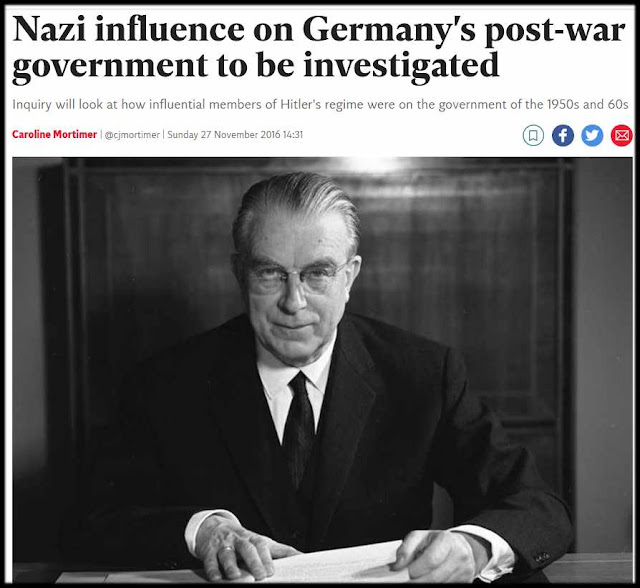
Germany’s ruling class has sought to expiate their guilt over the Holocaust by the simple expedient of transferring it onto the shoulders of the Palestinians. The German ruling class was never deNazified. Its first post-war Chancellor Konrad Adeneur had as his Chief of Staff, Hans Globke, who was instrumental in drafting the Nuremberg Laws. Globke was the second most powerful person in post-war Germany.
Globke had been responsible for the bright idea of giving every German Jew a name – Israel for males and Sara for females. This helped with identification. Globke, although a civil servant in the Nazi Ministry of Interior, was responsible for the murder of 20,000 Jews in Thessaloniki. When Eichmann contacted the Interior Ministry and asked for Globke’s permission to kill them he received it.
However Globke was protected by powerful interests and Israel, under Ben Gurion had reached an agreement with Adeneur not to rake up the past history of Germany’s leaders and top civil servants in exchange for reparations and arms supplies. The Holocaust provided Israel with many lucrative advantages and in exchange Israel agreed not to divide the Western alliance by raking up charges of Nazi complicity.
Instead it was the Arabs and their supporters who became the new Nazis. So although Achille Mbembe is idolised in German universities for his theories of post-colonialism he had trespassed on what is a fundamental principle. Do not criticise Israel lest you open a can of worms. Germany’s guilty conscience over the Holocaust is lubricated by arms to Israel and defamatory accusations of ‘anti-Semitism’ against anyone who doesn’t toe the line.
This is what is termed the new McCarthyism.
Tony Greenstein
Yesterday, an unbelievable verdict came down at the Beersheba District Court in Israel.
Two Israeli security officers were acquitted in a case involving the lynching of Haftom Zarhum, an Eritrean refugee, although they were filmed beating him and repeatedly dropping a bench on his head. The judge cited “reasonable doubt”.
The bloodthirsty mob lynching in October 2015 was part of a string of “mistaken identity” incidents in Israel. A terror attack had in fact taken place earlier at the Beersheba central bus station; a man from an unrecognized Bedouin village in the Negev opened fire, killing a soldier and wounding 11 others.
Zarhum was a passerby, who was mistaken for the shooter by a security guard because he was dark skinned. A police spokesman in the wake of the incident said that it was “not clear if [Zarhum] is involved with the event or if he was shot due to his exterior appearance.”
Zarhum was shot 8 times. Though he had been incapacitated, the mob continued to beat him heavily, shouting “terrorist!”, “Kill him!”, “break his head, son of a bitch!”. The two officers were in that mob. The Times of Israel notes:
“The indictment said that in the aftermath of the attack, [combat soldier Yaakov] Shimba kicked Zarhum in the head and upper body with force. It said [Prison Services officer Ronen] Cohen threw a bench onto him, and after another man removed the bench he took it and again dropped it on the prone man.”
The indictment states that although Zarhum was one of the most seriously wounded in the fracas, he was evacuated to hospital only after all other wounded were evacuated (per Haaretz).
The lynchers celebrated the killing on live TV broadcast, when they still believed that Zarhum was the shooter.
It is important to note, that the autopsy concluded that Zarhum died from his gunshot wounds, not from the beatings, but the beatings were severe. The prosecution stated that
“the defendants committed serious acts of violence towards the late citizen Haftom Zarhum, who was already shot, wounded and profusely bleeding, from a motive of vengeance and in order to relieve their anger, and not as the defendants claimed from self-defense”.
Originally, four people were charged in this case, and two of them were civilians. The civilians took a plea bargain in 2018 which downgraded the charge from “causing injury with grave intent” (which entails potential 20 years prison) to “abusing the helpless”. One was sentenced to four months in prison and the other got 100 days of community service and eight months of probation and was ordered to pay NIS 2,000 (approximately $550) compensation to Zarhum’s family.
But the security officers would not take a deal – they pleaded not guilty, and they got what they wanted from the judge – acquittal.
The judge Aharon Mishnayot has a long record as a military legal advisor and judge (from 1990, judge from 1998), and he spent the last part of his military career 2007-2013 as head judge of the military courts in the Occupied West Bank.
The judge stated that after having seen the evidence, he was “certain that the defendants were convinced that the deceased was one of several terrorists”, that the (mostly lone wolf) attacks of the time had “created an atmosphere of fear and panic in the public”, and that he could not
“ignore the connection of the event to the frequent terror events that had occurred in the state in those days, before the event at hand and the implications that this may have on the state of awareness of the involved”.
But the defendants were not responding to a security threat as such. They were acting in revenge. The judge is thus suggesting that pure revenge for Palestinian attacks is a mitigating circumstance.
The judge added, that that while the prosecution stated that the defendants could distinguish between “neutralizing a terrorist or who seemed to be one, and attacking an innocent person”, he is
“afraid that such appraisal is true for a utopian reality, where one can easily distinguish between good and bad and between friend and predator, but it defies the actual reality and to the real world, and does not correctly reflect the complex circumstances of the difficult situation, into which the people in the central station were unfortunately drawn at the evening of the attack, including the defendants”.
So the lynch mob, and in particular the security officials, were, according to the judge, simply victims themselves – victims of an “unfortunate circumstance”.
But what about Zarhum? Was he not really the victim of this “unfortunate circumstance” in a much more deadly way? And were not the lynchers creating this deadly circumstance in a singular way? After all, he was just a passerby, killed for his skin color.
And what would happen if Palestinians, for example, act like the defendants did?
Alma Bilbash noted a comparative case on her Facebook page: in 2005 an Israeli soldier, Eden Nathan Zada, opened fire on a bus at the Palestinian-Israeli village of Shefa-Amr, killing four and wounding twelve. After having been restrained and handcuffed, he was beaten to death by the crowd. So here we had an actual, certain, terror attack, with an ensuing lynching of the terrorist.
Let’s put aside the lopsided power structure of Palestinians in Israel in relation to the Jewish State. Eventually, six Palestinian Israelis were convicted – four of attempted manslaughter, two of aggravated battery. Three of them were sentenced to two years prison, the others to 20, 18 and 11 months prison.
Orly Noy notes in her Facebook post another comparison – to the case of Shlomo Haim Pinto from 2015, an Israeli Jew, who decided to stab a Palestinian in a supermarket out of a “spiritual calling”, but mistook Uri Razkan, a Mizrahi Jew, for a Palestinian, stabbed him and caused him moderate injuries. Pinto was sentenced to 11 months prison.
Noy comments that Pinto only went to prison because his victim was Jewish. If Razkan was not Jewish, it is possible to assume that judge Mishnayot from the Zarhum case would have acquitted Pinto due to “reasonable doubt”. She summarizes the “race pyramid that prevails here”:
“If you are a dark-skinned man, you are, per definition, in a risk group. Your skin color marks you as a target. If you are Jewish and your murderer was in uniform, you’ll get some media coverage but forget justice or sentence. If you’re not Jewish and your murderer wore uniform, say thank you if you don’t get declared a terrorist post-mortem. If you’re Jewish and your attacker was Jewish not in uniform, there’s a chance that he would pay for his deeds. If you are not Jewish and your attacker was Jewish not in uniform, your family will get a full 2000 Shekels that will bury you. If you’re Palestinian, whether your murderer wore uniform or not, be sure that you will be declared a terrorist after your death”.
Commenting on yesterday’s verdict, Ronen Cohen’s attorney Zion Amir said that Cohen was a hero:
“There is no doubt that this is a big day for an officer who acted heroically during the incident, and instead of an award got an indictment. I am glad that the court acquitted him after an almost five-years legal battle.”
Cohen is not the only hero in the killing of Hafton Zarhum. The soldier and fellow defendant Yaakov Shimba deserved a medal of honor for his acts, according to Israeli general (res.) Gershon Hacohen. Hacohen testified in the case two years ago and although admitting to not even having read the charges, he opined that charging the soldier is “immoral” and that the soldier is “worthy of respect” since he “didn’t shoot one bullet”. (Neither did George Floyd’s killer, Derek Chauvin, notes Edith Breslauer on Facebook.)
Another general who testified in 2018, Dan Biton, opined that the soldier acted “calmly”, even when he cursed Zarhum.
“He came from Golani (infantry brigade), so I don’t need to add anything. If he was from Armory it wouldn’t have been like that. It is calmness (to curse) which belongs to some from Golani. Whoever comes from Golani curses unconsciously. In the end, when examining the event throughout, he acted calmly”.
Just imagine how it would have been if Shimba had a bad day. It was a good day after all, per general Biton.
There was no doubt that Haftom Zarhum was lynched. There is absolutely no doubt that the two defendants were a central part of his lynching. But because they suspected Zarhum was a terrorist, although they never saw him touching a fly nor posing any kind of danger to them, in fact was incapacitated, their bloodthirsty revenge was “reasonable”. That’s “reasonable doubt” for you, in Israeli Newspeak.
Israel’s Top Court to Hear Appeal Against Deal With Soldier Who Killed Innocent Palestinian
Military prosecutors are seeking a penalty of three months’ community service for the soldier who shot Ahmad Manasra, who was helping another Palestinian who was shot and wounded by the same soldier
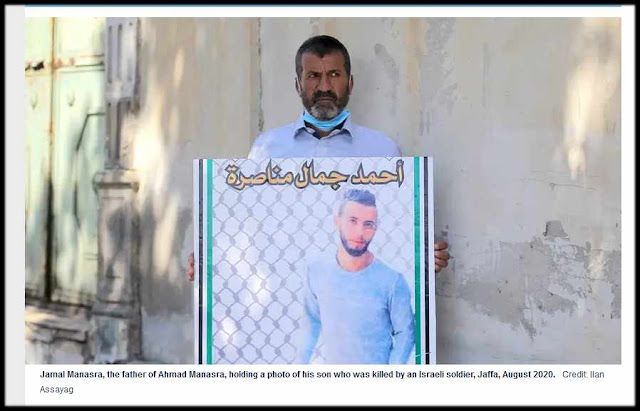
Published on 03.09.2020
Military prosecutors have proposed a sentence of three months’ community service in lieu of prison for an Israeli soldier accused of negligently shooting an innocent Palestinian to death.
Supreme Court Justice Noam Sohlberg has ruled that three judges of the High Court of Justice will hear an appeal against a plea bargain reached with the soldier who fatally shot 23-year-old Ahmad Manasra.
The victim was killed while helping another Palestinian who had been shot and seriously wounded by the same soldier. The soldier was charged with negligently causing death but was not charged with wounding the other man, even though that shooting is mentioned in the indictment. Two weeks ago, military prosecutors asked for a penalty of three months’ community service.
According to the indictment, a car accident occurred in March 2019, when a Palestinian, Alaa Raida, was driving with his wife and two daughters. Another car crashed into them near the village of al-Khader, then fled the scene. Raida stopped his car near an intersection, got out and waved his arms at the fleeing car. According to the indictment, the soldier, who was in a concrete pillbox near the intersection, thought Raida was throwing stones at Israeli cars. He called out a warning and fired into the air before shooting Raida.
In contrast, an affidavit submitted by Raida says he was shot outside his car without warning, contravening the army’s rules of engagement. He was wounded in his stomach and evacuated from the area in serious condition.
“Anyone reading the indictment can see that this was an execution,” said attorney Shlomo Lecker, who submitted the appeal.
“Raida was shot while stopping at a traffic light at an illuminated intersection, while exiting his vehicle. Ahmad was shot while fleeing for his life. It was [rifle] fire directed straight at him.”
The indictment notes the assistance Manasra gave Raida, after arriving at the scene with three other friends who were returning with him from a wedding in Bethlehem in the West Bank. The three helped evacuate Raida to the hospital, while Manasra stayed at the scene with Raida’s wife and daughters, helping them start their car. According to the indictment, he was shot while emerging from his car, and shot again while trying to flee.
- Israeli Army Seeks Three Months Community Service for Soldier Who Killed Innocent Palestinian
- ‘Nothing Changes’: Palestinians Report Attacks by Israeli Settlers on West Bank Villages
The military prosecution’s response to the appeal shows that the soldier deleted messages he had sent other soldiers regarding the incident. Moreover, it is noted that soldiers who had served with the accused remarked that he was very enthusiastic about using his weapon in some kind of operation. A source familiar with the case says the deleted messages were found on other phones, and that the soldier’s version was consistent.
The appeal notes that no other soldier testified that stones were thrown at that location and that no one was in danger. No other soldier saw the entire incident unfold. Footage from surveillance cameras was collected, but it was argued that the quality was poor. Some soldiers who testified during the trial said that right after the incident, the accused told them that he had shot stone throwers.
It also turned out that stones were found in the area, but the indictment made no mention of stone throwing. Military prosecutors labeled this case as “complex,” since the incident occurred during operations in a tense area in which other incidents were taking place. They added that this incident happened soon after an alert was issued regarding a possible attack. However, they noted that the soldier’s training for dealing with such events was “somewhat flawed.”
The response to the appeal notes that the soldier was questioned under caution three times, as were his commanders. According to the soldier’s attorney, he felt that civilians were endangered by stone throwing before he opened fire. The soldier claimed that he was following the rules of engagement and that this was the first time he had used his weapon in an operation. Before his hearing, prosecutors had intended to charge him with negligent cause of death, causing aggravated bodily harm and destruction of evidence. After the hearing, they signed a plea bargain in which the soldier admitted to one charge, negligent cause of death.
Opening fire under the rules if engagement is a central issue in this case, since according to the soldier, he acted appropriately when he shot Raida. That is why wounding Raida is not part of the indictment.
Even for the Wild West Bank, This Is a Shocking Story
Gideon Levy
A young Palestinian’s attempt to help a stranger shot by Israeli troops costs him his life.
It was appallingly cold, rainy and foggy on Monday of this week at the southern entrance to Bethlehem. A group of young people stood on the side of the road, gazing at something. Gloomy and toughened, they formed a circle around the concrete cube in which are sunken the spikes of a large billboard – an ad for Kia cars that stretches across the road. They were looking for signs of blood, as though they were volunteers in Zaka, the Israeli emergency response organization. They were looking for bloodstains of their friend, who was killed there five days earlier. Behind the concrete cube they found what they were looking for, a large bloodstain, now congealed. The stain held fast despite the heavy rain, as though refusing to be washed away, determined to remain there, a silent monument.
This is where their friend tried, in his last moments, to find protection from the soldiers who were shooting at him, probably from the armored concrete tower that looms over the intersection a few dozen meters away. It was to here that he fled, already wounded, attempting to take cover behind the concrete cube. But it was too late. His fate was sealed by the soldiers. Six bullets slashed into his body and killed him. He collapsed and died next to the concrete cube by the side of the road.
Even in a situation in which anything is possible, this is an unbelievable story. It’s 9 P.M. Wednesday March 20. A family is returning from an outing. Their car breaks down. The father of the family, Ala Raida, 38, from the village of Nahalin, who is legally employed paving roads in Israel, steps out of his Volkswagen Golf to see what has happened. His wife, Maisa, 34, and their two daughters, Sirin, 8, and Lin, 5, wait in the car. Suddenly the mother hears a single shot and sees her husband lean back onto the car. Emerging from the car, she discovers to her astonishment that he’s wounded in the stomach. She shouts hysterically for help, the girls in the car are crying and screaming.
Another car, a Kia Sportage, arrives at the intersection. Its occupants are four young people from the nearby village of Wadi Fukin. They’re on the way home from the wedding of their friend Mahmoud Lahruv, held that evening in the Hall of Dreams in Bethlehem. At the sight of the woman next to the traffic light appealing for help, they stop the car and get out to see what they can do. Three of them quickly carry the wounded man to their car and rush him to the nearest hospital, Al-Yamamah, in the town of Al-Khader. The fourth young man, Ahmad Manasra, 23, stays behind to calm the woman and the frightened girls. Manasra tries to start the stalled car in order to move it away from the dangerous intersection, but the vehicle doesn’t respond. He then gets back out of the car. The soldiers start firing at him. He tries to get to the concrete cube but is struck by the bullets as he runs. Three rounds hit him in the back and chest, the others slam into his lower body. He dies on the spot.
The army says that stones were thrown. All the eyewitnesses deny that outright. Nor is it clear what the target of the stones might have been. The armored concrete tower? And even if stones were thrown at cars heading for the settlement of Efrat, is that a reason to open fire with live ammunition on a driver whose car broke down, with his wife and young daughters on board? Or on a young man who tried to get the car moving and to calm the mother and her daughters? Shooting with no restraint? With no pity? With no law?
We visit the skeleton of an unfinished apartment on the second floor of a house in Wadi Fukin. It’s an impoverished West Bank village just over the Green Line, whose residents fled in 1949 and were allowed to return in 1972, and which is now imprisoned between the giant ultra-Orthodox settlement of Betar Ilit and the town of Tzur Hadassah, which is just inside the Green Line. A wood stove tries to rebuff the bitter cold in the broad space between the unplastered walls and the untiled floor. A grim-looking group of men are sitting around the fire, trying to warm themselves. They are the mourners for Manasra; this was going to be his apartment one day, when he got married. That will never happen now.
Only the memorial posters remain in the unbuilt space. A relative and fellow villager, Adel Atiyah, an ambassador in the Palestinian delegation to the European Union, calls from Brussels to offer his shocked condolences. One of the mourners, Fahmi Manasra, lives in Toronto and is here on a visit to his native land. The atmosphere is dark and pained.
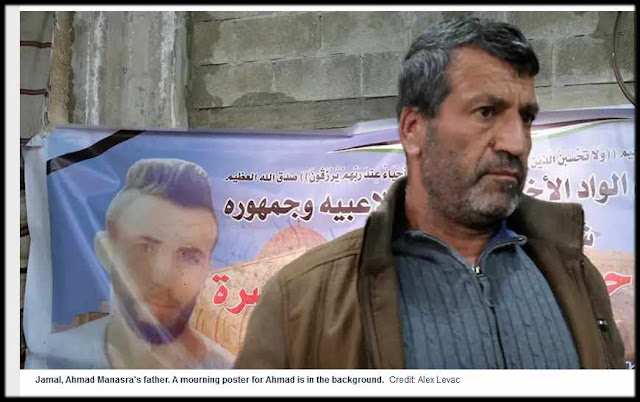
The bereaved father, Jamal, 50, is resting in his apartment on the ground floor. When he comes upstairs, it’s clear he’s a person deeply immersed in his grief though impressive in his restraint. He’s a tiler who works in Israel with a permit. He last saw his son as he drove along the main street in Bethlehem as his son was going to his friend’s wedding. Jamal was driving his wife, Wafa, home from another wedding. That was about two hours before Ahmad was killed. In the last two days of his life they worked together, Jamal and his son, in the family vineyard, clearing away cuttings and spraying. Now he wistfully remembers those precious moments. Ahmad asked to borrow his father’s car to drive to the wedding, but Jamal needed it to visit the doctor, and Ahmad joined the group in Wahib Manasra’s SUV.
Quiet prevails in the shell of the unfinished apartment. Someone says that Manasra was already planning the layout of his future home – the living room would be here, the kitchen there. Maisa Raida, the wife of the wounded driver, is at her husband’s bedside at Hadassah Medical Center, Ein Karem, Jerusalem, where he’s recovering from his severe stomach wound. He was brought there from Al-Khader because of the seriousness of his condition. Major damage was done to internal organs in his abdomen and he needed complicated surgery, but he seems to be on the mend.
Maisa told a local field investigator from a human rights group that at first she didn’t realize that her husband was wounded. Only after she stepped out of the car did she see that he was leaning on the vehicle because of the wound. She yelled for help, and after the young men stopped and took her husband to the hospital, she got back into the car with Manasra, whom she didn’t know. While they were in the car with her daughters, and he was trying get it started, she heard another burst of gunfire aimed at their car from the side, but which didn’t hit them.
She had no idea that Manasra was shot and killed when he got out of the car, moments later. She stayed inside, trying to calm the girls. It wasn’t until she called her father and her brother-in-law and they arrived and took her to Al-Yamamah Hospital that she heard that someone had been killed. Appalled, she thought they meant her husband but was told that the dead person had been taken to Al-Hussein Hospital in Beit Jala.
Eventually, she realized that the man who was killed was the same young man who tried to help her and her daughters; he was dead on arrival. Before Maisa and her daughters were taken from the scene, an officer and soldiers from the Israel Defense Forces came to the stalled car and tried to calm them.
Manasra was dead by then, sprawled next to the concrete cube. He was a Real Madrid fan and liked cars. Until recently he worked in the settlement of Hadar Betar, inside Betar Ilit. His little brother, 8-year-old Abdel Rahman, wanders among the mourners in a daze.
After Jamal Manasra returned home, his phone began ringing nonstop. He decided not to answer. He says he was afraid to answer, he had forebodings from God. He and his wife drove to the hospital in Beit Jala. He has no rational explanation for why they went to the hospital. From God. “I was the last to know,” he says in Hebrew. At the hospital, he was asked whether he was Ahmad’s father. Then he understood. He and his wife have two more sons and a daughter. Ahmad was their firstborn.
We asked the IDF Spokesperson’s Unit a number of questions. Why did the soldiers shoot Ala Raida and Ahmad Manasra with live ammunition? Why did they go on shooting at Manasra even after he tried to flee? Did the soldiers fire from the armored watchtower? Do the security cameras show that stones were indeed thrown? Were the soldiers in mortal danger?
This was the IDF’s response to all these questions:
“On March 21, a debriefing was held headed by the commander of the Judea and Samaria Division, Brig. Gen. Eran Niv, and the commander of the Etzion territorial brigade, Col. David Shapira, in the area of the event that took place on Thursday [actually, it was a Wednesday] at the Efrat junction and at the entrance to Bethlehem. From the debriefing it emerges that an IDF fighter who was on guard at a military position near the intersection spotted a suspect who was throwing stones at vehicles in the area and carried out the procedure for arresting a suspect, which ended in shooting. As a result of the shooting, the suspect was killed and another Palestinian was wounded.”
“The possibility is being examined that there was friction between Palestinians, which included stone-throwing.
“The inquiry into the event continues, parallel to the opening of an investigation by the Military Police.”
After the group of young people found what they were looking for – bloodstains of their friend, Ahmad – they reconstructed for us the events of that horrific evening. It was important for them to talk to an Israeli journalist. They’re the three who came out alive from the drive home after the wedding. One of them, Ahmad Manasra – he has the same name as the young man who was killed – wouldn’t get out of the car when we were there. He’s still traumatized. Wahib Manasra, the driver of the SUV, showed us where the stalled VW had been, and where they stopped when they saw a woman shouting for help.
Soldiers and security cameras viewed us even now, from the watchtower, which is no more than 30 meters from the site. Wahib says that if there was stone-throwing, or if they had noticed soldiers, they wouldn’t have stopped and gotten out of the car. Raida, the wounded man, kept mumbling, “My daughters, my daughters,” when they approached him. He leaned on them and they put him in their car. By the time they reached the gas station down the road, he had lost consciousness. Before that, he again mumbled, “My daughters.”
Wahib and the other Ahmad, the one who was alive, returned quickly from the hospital, which is just a few minutes from the site. But they could no longer get close to the scene, as a great many cars were congregated there. They got out of the car and proceeded on foot. A Palestinian ambulance went by. Looking through the window, Wahib saw to his horror his friend, Ahmad Manasra, whom they had left on the road with the woman and her girls, lying inside. He saw at once that Ahmad was dead.
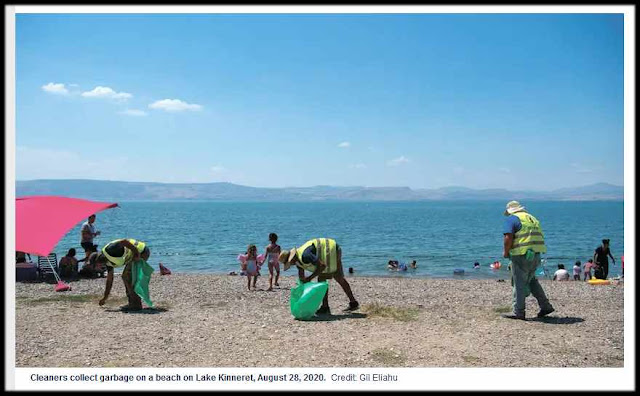
Littering and Violent Racism Break Record as Israelis Flock to Sea of Galilee Shores
‘They tell us we have no place in this country, that we’re their slaves
Cleaners recount tales of discrimination and disrespectNoa ShpigelPublished on 31.08.2020
In the final week of August, beaches along Sea of Galilee and streams in the Galilee are reflecting two facets of Israel. On one side, hundreds of thousands of citizens with nowhere to fly are descending on every water source or footpath, leaving behind mountains of garbage. Trailing them and attending this mess are workers who, for meager pay and under difficult conditions, have to contend with a country in which discarded beer cans and snack food wrappers have become an inseparable part of the landscape. And these workers, who remain behind to return nature to some semblance of normalcy, report constant daily bullying and expressions of racism by visitors.
Towards the weekend, cleaning staff on Levanon Beach on the eastern side of the Sea of Galilee, or Lake Kinneret, could breathe more easily for a while. This is when the profile of visitors changes, with families with children replacing groups of young adults. As children frolick in the water and smoke rises from a barbecue, Tarek Hassuna, from the Arab village of Misr, who has worked here for a decade, describes an incident from the previous day.
“We swept the grassy area with eight workers at midday”, he says. Then they encountered a group of young people who looked like hilltop youth, an idiom for young, radical Israeli settlers, so called because they originally lived on unsanctioned illegal outposts on West Bank hills.
“We brought them a garbage bag, and one of the girls in the group said that she doesn’t need the bag. ‘The Hasbani Stream is mine, Be’er Sheva is mine and so is Hebron. The whole country is mine and you are the ones who have to clean it,’ she said.”
“I didn’t argue with her. I called my supervisor and he sent a policeman, who came within seconds. He told them that if they didn’t clean up, they’d have to leave. We now have inspectors and policemen accompanying us while we work.”
Hassuna says that incidents like these have pushed some of the older cleaners to stop working.
“They have families, they’re afraid. I’m 45. Girls come looking for an argument. There are bins right there but they throw garbage next to them on purpose.”
A visit to the beach shows some garbage next to a bin, as well as vandalized equipment. This bothers the workers less than the harassment by visitors.
“This year, most of the visitors are okay,” says 53-year-old Bassem Zoabi, also from Misr. “But there are young people making racist comments. This year they’ve crossed all lines: One manager was even beaten up,” he says, before recounting an incident from two weeks before. Three cleaners asked a group of young people on the beach to lower the volume of the music they were playing, and a clash broke out, with dozens of youths taking part. The police said that this was not a racially-motivated incident and detained three workers as well.
“My workers hear calls such as ‘death to Arabs’ and ‘dirty Arab’ all the time. Our managers back us and we can call them anytime,” says Zoabi. “I only hope no one is murdered here. Other nearby beaches don’t have this. I don’t know why it happens only here.” He shows us photos of broken toilets and excrement smeared on walls. He’s been working these beaches for 30 years, currently as a contractor. He says that this year is unusually harsh by any standard.
Zoabi’s son Sharif has been working here for a decade. He too talks about racist taunts he is constantly subjected to.
“The minds of 14-year-old children are full of hatred and racism. They tell us we have no place in this country, that we’re their slaves. I don’t respond when they curse us and the police. They use drugs and alcohol. Two girls pushed a worker into a latrine yesterday, telling him to clean it. They break bottles and children cut their feet, and we get the blame.”
Hassuna says that in the past there was the odd troublemaker, but now they are the majority.
“You have some good ones, but most have grown up on hatred. We live near a kibbutz and have never felt that. I served in the army and contributed to the state.”
The head of the regional council said that this team is devoted, working hard to keep the beaches clean, but that the violence and racism must be condemned.
Not all visitors behave that way. One of them notes how clean and quiet the area is. He jokes with the cleaners that if everyone disposed of their garbage like he does, they’d have no work.
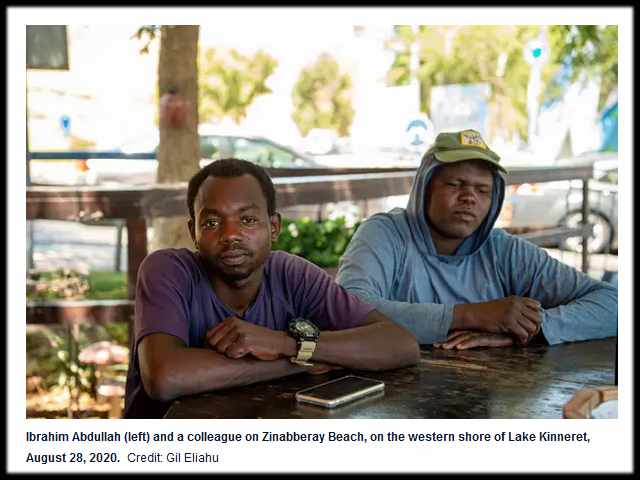
The western side of the lake is somewhat different. Most of the cleaners are Sudanese. Ibrahim Abdullah has been working there for seven years.
“There is more filth here now, more garbage. Some people don’t talk nicely. Some drunk Arabs quarreled with me two weeks ago. They despise Sudanese. Some of them laugh at us.”
A friend of his, also from Sudan, proudly shows his Israeli ID card. He’s been working here for nine years, also saying some people don’t clean up when they leave. His mobile phone was stolen for the first time this year, after all the years he’s worked here.
Merciless heat
Small numbers of cleaning staff along streams in the north have to contend with masses of visitors, many of whom leave behind creative forms of garbage. One cleaning contractor shows us photos of carpets and armchairs left in the area.
“People don’t care about cleanliness here. They don’t see these sites as needing to be kept clean. Ten percent of the visitors clean up while the rest leave their garbage behind. Bags they leave here are scattered at night by wild animals and the garbage gets into the water, floating down to the Kinneret,”
he says.
This contractor hasn’t encountered physical violence, but he has been cursed. He takes it lightly, noting that the police are often summoned.
“Workers aren’t heeded when asking people to pick up their garbage so they call their supervisors. When these are also ignored, they call the police. This happens every week.”
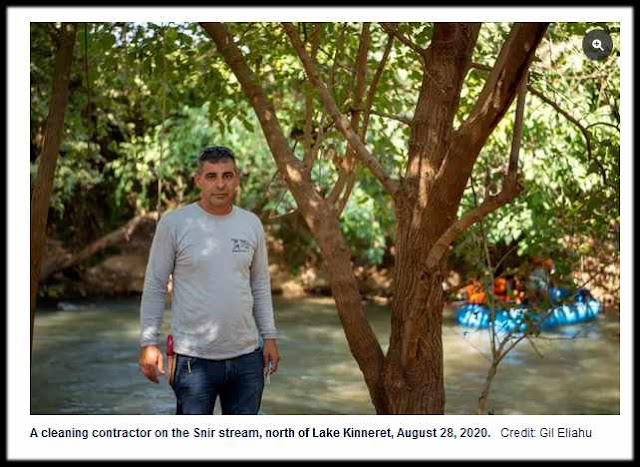
Signs forbidding people to stay overnight at Snir Stream are ignored, as are requests to keep the noise down, avoid lighting fires or swimming. The head of the regional council says that spending time in nature makes people better and is good for the local economy. “Just obey the rules and keep it clean,” he asks.
The cleaning contractor says that when he distributes garbage bags, some people understand while others get angry, saying that it’s obvious that they have to clean up.
“But ultimately, most people don’t. The young ones are the worst. They cause damage and say that only suckers clean up. Let the state or the contractor clean up, they say.”
Israeli Police Detain Five in Brawl at Beach, Witness Says Teens Shouted ‘Death to Arabs’
People threw stones as cleaners hid in a prefab structure, witness says Brawl began after cleaners asked teenagers to lower music, investigation finds
Noa Shpigel Published on 19.08.2020
Five people were detained on Tuesday on suspicion they were involved in a brawl at a Sea of Galilee beach that, according to an initial investigation, erupted after cleaners asked teenagers to turn down the volume of their music.
According to witness Bassam Zoabi, the work supervisor at the beach, at one point the the cleaners hid in a prefab structure, with some 200 people gathering around. He said people threw stones at the structure and yelled “death to Arabs,” and that pepper spray was used. Local authorities confirmed that stones and tear gas were used and calls of “Death to Arabs” were heard. The police, however, said the cleaners didn’t complain about slurs or stones.
The five suspects, two boys aged 15 and 16 and three cleaners, were released with restrictions and ordered to stay away from the beach. None of those involved required medical attention.
“The cleaning workers and their shift supervisor, who were collecting trash, came to a group of youths and asked them to turn off the music because it’s a quiet beach, and [the youths] jumped them,”
said Zoabi.
“The workers hid in the caravan. When I got there, I saw 200 people throwing stones at the caravan and yelling. If we hadn’t gotten there they would have set them on fire.”
Zoabi was critical of the police.
“Who did the police take? They took the cleaning workers for questioning. They were questioned from 1:00 A.M. until 11:00 A.M.. They didn’t arrest even one of the 200 who attacked [them].”
He said that the racism exhibited during the incident is not new, although on Tuesday things escalated further than usual.
“Every night people shout ‘Death to Arabs.’ It’s been like that for a month already,”
How Israel Became Exempt From the Global Reckoning Over Racism
World sensitivity to racism and oppression is surging, but historical injustice in Israel is hardly drawing to an end. In fact, it’s only getting worse
Ofri Ilany Published on 18.06.2020
For a few weeks, a furious debate has been raging in the German media, centering around the Cameroonian philosopher Achille Mbembe. In the eyes of many, Mbembe, who has taught at Yale and Berkeley, is the most influential African intellectual of our time. He is one of the most prominent and most incisive thinkers about postcolonialism in the present period. He coined the term “necropolitics,” referring to the use of political power to determine who will live and who will die.
Mbembe is well known among the educated public in Germany; some of his books have been published there, and he has been the recipient of prestigious awards. He is also an active participant in the debate over the rise of authoritarian regimes worldwide. But the attitude toward him underwent a sea-change lately, when he was accused of being anti-Israel and of “relativizing the Holocaust.”
Felix Klein, Germany’s federal commissioner for the fight against antisemitism, demanded the revocation of Mbembe’s invitation to participate in a culture festival, on the grounds that the philosopher had denied the distinctive status of the Holocaust and had supported BDS. Indeed, Mbembe has frequently likened the colonial occupation of Palestine to the apartheid regime in South Africa.
In previous cases, anyone accused of denying Israel’s right to exist would immediately find him- or herself persona non grata in Germany. But in this case, the dilemma was especially difficult. Mbembe is a popular interviewee in the culture and thought columns of the German press; when the opinion of an African intellectual is wanted, he is sought out.
Furthermore, postcolonial theory is a popular field in academic and literary realms in Germany, and the delegitimation of Mbembe spells the complete rejection of that line of thought. What’s the solution? To pontificate about postcolonialism and resistance to racism, but to mark out Israel as a special case to which the rules of the postcolonial debate do not apply.
The German case is exceptional, because German politicians and media outlets are known for their shameless refusal to countenance any and all criticism of Israel. But the Mbembe affair marks a fundamental paradox that characterizes current public discourse in Europe and the United States. Sensitivity toward racism and white arrogance is on the rise in liberal circles. In the wake of the recent protests in the United States, lively discussions are being held on questions of diversity, appropriation and recognition of colonial crimes. Yet simultaneously, the commitment to the Palestinian cause and the struggle against the occupation is on the wane.
In Britain, former Labor Party leader Jeremy Corbyn mustered considerable support but was marked as a dangerous fanatic mainly because of his statements against Israel. Increasing numbers of platforms and media outlets worldwide can be seen to shy away from even using the word “occupation” – and this is at a time when Israel is declaring its intention to found an almost overtly apartheid regime in the Jordan Valley.
Different rules have always applied to Israel, both from within and without. Here, anti-African racism is more or less official policy. When it comes to asylum seekers in Israel, there isn’t even an attempt to pretend that black lives matter. The authorities work overtime to embitter the lives of refugees from Africa, at times invoking openly white-supremacist rhetoric. Palestinian resistance – even verbal – to the violence of the army, the police and the Shin Bet security service is also classified as “support for terrorism.”
Moreover, when soldiers kill a Palestinian child, the Israeli media tend to worry principally about the PR damage the event might entail. The Israeli government knows that there is hardly any effective barrier today against whatever policy it wants to implement in the territories. At most, there will be feeble remonstrations from Europe.
Precisely at a time of a worldwide awakening of opposition to racism, Israel is considering a horrific scenario that the left has been warning about for 50 years: annexation of the territories. At the moment of truth, attempts to prevent the move seem to be both scattered and hesitant. Racism is infuriating, but the occupation is a yawn.
Different explanations exist for the indifference to the Palestinians shown by world public opinion. It’s related to the political changes in the United States and Europe, the disintegration of Arab nationalism and also the weakness of the Palestinian national project. But what’s odd is that the Palestinians don’t especially interest even President Trump’s avowed opponents – all those young, sensitive people who are waking up and venting their wrath on the streets and in the social media. Most of them couldn’t give two hoots about any annexation plan.
Poor visuals
The explanation for this paradox may lie in the fact that the occupation has yet to be transformed into a dilemma associated with the morality of one’s lifestyle. The questions that currently engage the liberal classes touch on the individual’s consumer choices. Should one use cow’s milk or soy milk? Is it right to watch reruns of the television series “Friends” even though there are no blacks in it? And what do we do with the books of J.K. Rowling, who spoke out against trans people? The occupation, in contrast, is an old, musty political issue. It doesn’t have a visual representation like blackface, and to understand what it’s all about you have to be acquainted with maps and historical dates.
In Israel, too, there are many who want to take part in the current discussion about the issues of racism and cultural appropriation. If it plays well in Hollywood and on HBO, naturally it will sooner or later reach Israel’s hip consumers of culture. As such, we can imagine a group of with-it young folks from the Har Adar settlement or from Ariel University conducting a discussion about whether the safari ad campaign featuring model Rotem Sela, for the clothing retailer Castro, is racist, and whether it’s legitimate for a celebrity to have their photo taken for Instagram next to Black Lives Matter demonstrators. Enlightened Israelis too want to engage in historical recognition and reckoning, and to take a knee on behalf of the oppressed.
The problem is that in Israel, historical injustice isn’t even approaching its conclusion. In fact, it’s just getting worse. One can’t deal with processing the crimes of the past when the crimes belong to the present and the future.
Admittedly, issues of the “new politics” – the politics of self, focusing on the body and identity – have shunted the Palestinian question to the margins of consciousness, both in Israel and everywhere else. Even so, perhaps this situation will ultimately give rise to hope for the Palestinian people, which is being crushed under the occupation. Possibly all that’s needed is to adapt resistance to the occupation to the logic of the contemporary political discourse. To frame the anti-Palestinian racism as a question of lifestyle and cultural representation.
Some are already moving in this direction, with slogans like “Palestinian Lives Matter,” but they are having little success. Still, it might happen – if, say, a young Palestinian-American woman who’s queer and vegan is discovered as the next hot thing on Netflix.